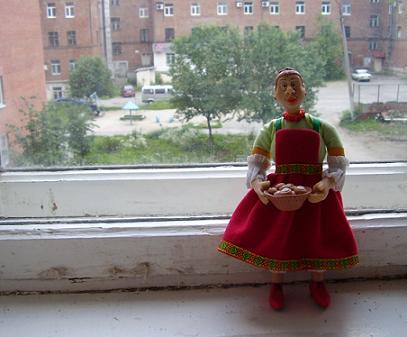Another Russian Eternal Question: Soul [«одушевлённый»] or No Soul [«неодушевлённый»]? Posted by josefina on Jul 15, 2009 in Culture, language
Pictured above is «Марфа» [Marfa], a handmade «кукла» [doll] given to me by my very talented and close friend in Tomsk in May earlier this year. Even though I would argue – being as it is that I’m an adult nowadays – that Marfa in her capacity as doll is «неодушевлённое существительное» [‘without soul’; an inanimate noun], according to Russian grammar she is not. According to Russian grammar a doll is «одушевлённое существительное» [an animate noun]. Female nouns in singular act the same in accusative case, no matter if they’re animate or inanimate. For example: «я вижу Марфу» [I see Marfa] and «я вижу куклу» [I see a/the doll]. It only gets interesting when we have animate nouns in their plural form, because that’s when accusative uses the form for GENITIVE PLURAL. Look: «я вижу кукол» [I see dolls].
In the last post about «винительный падеж» [accusative case] I left out information about what happens to «одушевлённые существительные множественного числа» [animate nouns in plural] because this whole Russian grammatical phenomena of «одушевлённость» [‘be-souledness’; or, more properly ‘animatedness’,] versus «неодушевлённость» [not ‘be-souledness’; ‘inanimatedness’] deserves a post of its own. And today is the day I will dedicate to explaining this further (though not completely, of course, since nothing in Russian language can ever be explained completely, and that’s one of the many reasons as to why we’re studying it, right?) But why on Earth do I confuse the readers by translating these Russian abstract words with a little help from the English word ‘soul’? Well, because inside both of these Russian words we find traces of the word «душа» [soul]. Knowing this, then the basic rule should be very simple and sound something like: «одушевлённые существительные» equal living creatures, i.e. nouns with a soul, and «неодушевлённые существительные» equal not living creatures, i.e. nouns without a soul. Female nouns in singular, both animate and inanimate, use the same form in accusative:
«Вы знаете мою жену?» – [Do you know my wife (animate)?]
«Вы знаете эту книгу?» – [Do you know this book (inanimate)?]
Female nouns in plural, however, have a distinct difference between animate and inanimate nouns. For inanimate female nouns in plural, the form used is accusative. For animate female nouns in plural, the form used is the same as in genitive plural. For example:
«Мы встретили жён Паши и Жени» – [We met the wives (animate plural) of Pasha (short for Pavel) and Zenya (short for Eugene)].
«Мы купили книги» – [We bought (the) books (inanimate plural)].
Male animate nouns – both singular and plural – always use the same form in accusative as in genitive. It could be argued that the accusative form is entirely borrowed from the genitive form. Let’s have a look at a few sentences where this is illustrated:
«Я люблю мужА» – [I love (my) husband (animate)].
«Я люблю Китай» – [I love China (inanimate)].
«Обычно жёны любят своих мужЕЙ» – [Usually wives love their husbands (animate plural)].
«Она видит мальчикОВ» – [She sees (the) boys (animate plural)].
«Она видит цветы» – [She sees (the) flowers (inanimate plural)].
«Мы купили котА» – [We bought a (male) cat (animate)].
«Они купили фильм Тарковского» – [They bought a movie by Tarkovsky (inanimate)].

«Играть в шахматы на улице» [to play chess outside (lit. ‘on the street’)] is a very popular pastime among many Russians (mostly for men, though, for some strange reason) in cities of all sizes and populations. And in chess we find one of the exceptions to the rule ‘soul’ or ‘no soul’ in words like «ферзь» [in chess: queen (masculine noun) – genitive and accusative: «ферзя»] and «слон» [in chess: bishop, otherwise: elephant].
Other strange exceptions to this rule in Russian language are the words «мертвец» [dead person] and «покойник» [the deceased] which are animate, whereas the word «труп» [dead body; corpse; cadaver] is inanimate. Because of this you must remember that there’s a clear difference between the following three sentences: «я увидела мертвеца и закричала» [I saw a dead person and started to scream], «я увидела покойника и закричала» [I saw the deceased and started to scream] and «я увидела труп и закричала» [I saw a dead body and started to scream]. Maybe this clear difference is not so much as in WHAT you saw, but in HOW you put it GRAMMATICALLY. Also in the last sentence – where the noun is inanimate – it could be argued that it differs from the other two because the ‘dead body’ is just a ‘body’ or a ‘corpse’ thus clearly lacking any soul whatsoever. The two first sentences could be indicating that the dead person is moving in some way or another – a ghost, perhaps? – and maybe still in possession of his or her soul. And who said Russian grammar wasn’t logical?
And a last note regarding the word «лицо» [person; face]. This word has two meanings: one is animate (person) and the other is inanimate (face). When using the word «лицо» in the meaning of ‘face’ a correct sentence with plural form of this noun would sound something like: «на вечеринке я видел красивые лица» [at the party I saw beautiful faces]. But use the word «лицо» in the meaning of ‘persons’ and you must use the genitive form in accusative, like this: «на вечеринке я видел важных лиц» [at the party I saw important persons].
Next time we’ll continue our exploration of accusative!

Build vocabulary, practice pronunciation, and more with Transparent Language Online. Available anytime, anywhere, on any device.




